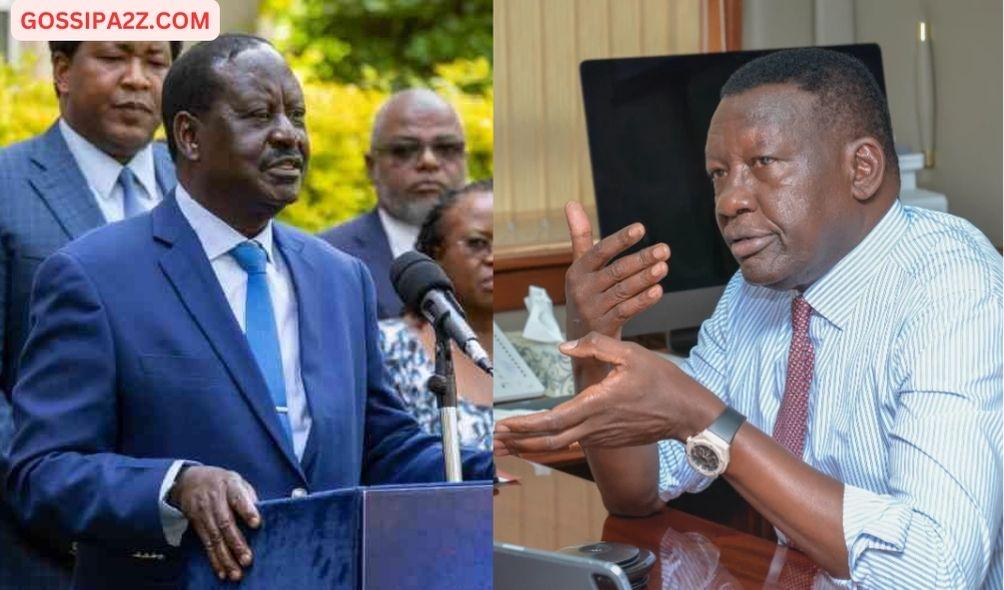CS Chirchir Clarifies Controversial Oil Deal Amidst Allegations by Raila Odinga
Energy and Petroleum Cabinet Secretary Davis Chirchir has come out to clarify details of the controversial government-to-government oil deal, which has since been termed by opposition leader Raila Odinga as nothing but a sham aimed at driving up the cost of fuel while benefiting shadowy State officials.
CS Chirchir, in a statement to newsrooms on Thursday evening, sought to rubbish Mr. Odinga’s remarks, going ahead to explain the origin of the deal.
According to the Energy boss, Oil Marketing Companies were over the last two years unable to access petroleum products over an alleged lack of USD liquidity and outstanding subsidies from the government.
He stated that the Kenya Kwanza administration, upon coming into power, put out a tender for government-owned international oil companies to bid for the supply of petroleum on 180-day deferred payment terms and a contract period of 270 days.
By the close of the tender on March 6, 2023, Chirchir stated, that the government had received bids from; Emirates National Oil Company, Abu Dhabi National Oil Company, Saudi Aramco, Petrosa & Trafigura, Vitol Bahrain, and State Owned Company of the Republic of Azerbaijani.
He, however, went on to state that the tender was canceled after the bidders failed to meet the set requirements, upon which the State undertook direct negotiations with State-owned bidders and their respective governments, leading to the signing of Memoranda of Understanding (MoU) with the Kingdom of Saudi Arabia and the United Arab Emirates.
“On 10th March 2023, GoK through the Ministry of Energy and Petroleum entered into Master Framework Agreements (MFAs) with Aramco Trading Fujairah FZE (ARAMCO), Abu Dhabi National Oil Company (ADNOC) Global Trading Ltd and Emirates National Oil Company (Singapore) Private Limited (ENOC) for the supply of petroleum products under a Government-to-Government arrangement (the G-to-G arrangement) on extended credit terms of 180 days,” Chirchir said.
“Contrary to the assertion that the government selected/handpicked the Nominated Oil Marketing Companies (OMCs), the selection of the Nominated OMCs is the prerogative of the International Oil Companies (IOCs) in line with the Master Framework Agreement.”
ALSO READ:
- The main suspect behind North Rift banditry arrested
- Ruto Vows Business Ease: Promises License Reduction for Startups
He added: “In any case, the IOCs would have opted to handle the entire chain of the transaction which would have necessitated them to be licensed in Kenya. However, they opted to nominate counterparties to handle local logistics. The IOCs nominated Gulf Energy Limited, Galana Energies Limited, and Oryx Energies Kenya Limited as their counterparties in the transaction. The pricing of the products is stipulated in the Master Framework Agreement.”
The Energy minister further stated that the government-to-government deal was aimed at solving a forex liquidity problem which he said was threatening the security of supply of petroleum for the country and the region.
He went on to address Mr. Odinga’s claims on the allegedly hiked prices of fuel in the country, saying the cost of petroleum is computed by the Energy and Petroleum Regulatory Authority (EPRA) based on the volume and cost of cargoes discharged at the Port of Mombasa between the 10th of the previous month and the 9th of the pricing month.
“In the November-December 2023 pricing cycle, EPRA considered in its price computation 2 Super Petrol cargoes priced in September 2023, 4 Diesel cargoes priced September 2023 and 2 cargoes of Jet A1 one priced September 2023 and the other October 2023, all these cargoes were delivered between 10th October 2023 and 9th November 2023. It’s instructive to note that the September 2023 Platts prices were the highest in the last 12 months,” added the CS.
“The disparity in price computation between Kenya and Tanzania is a result of differences in the pricing methodologies that create a lag effect. The impact of the different pricing methodologies has resulted in a temporary price advantage to Tanzania in a declining market.”
Chirchir added: “The Northern corridor remains the most competitive in the transportation of petroleum products to Kampala and the adjacent countries which have traditionally been supplied through Kenya. I confirm that there has been no change in the transit volumes to Uganda and the neighboring countries through the Kenya Pipeline Company Limited. Uganda has always utilized both the northern corridor (90%) and the central corridor (10%) to meet its petroleum demand and this has not changed.”
CS Chirchir Clarifies Controversial Oil Deal Amidst Allegations by Raila Odinga
